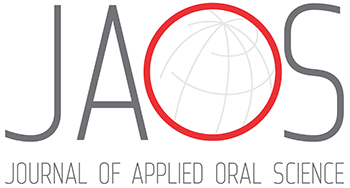OBJECTIVE:
The shear bond strengths of two hard chairside reline resin materials and an auto-polymerizing denture base resin material to cast Ti and a Co-Cr alloy treated using four conditioning methods were investigated.
MATERIAL AND METHODS:
Disk specimens (diameter 10 mm and thickness 2.5 mm) were cast from pure Ti and Co-Cr alloy. The specimens were wet-ground to a final surface finish of 600 grit, air-dried, and treated with the following bonding systems: 1) air-abraded with 50-70-µm grain alumina (CON); 2) 1) + conditioned with a primer, including an acidic phosphonoacetate monomer (MHPA); 3) 1) + conditioned with a primer including a diphosphate monomer (MDP); 4) treated with a tribochemical system. Three resin materials were applied to each metal specimen. Shear bond strengths were determined before and after 10,000 thermocycles.
RESULTS:
The strengths decreased after thermocycling for all combinations. Among the resin materials assessed, the denture base material showed significantly (p<0.05) greater shear bond strengths than the two reline materials, except for the CON condition. After 10,000 thermocycles, the bond strengths of two reline materials decreased to less than 10 MPa for both metals. The bond strengths of the denture base material with MDP were sufficient: 34.56 MPa for cast Ti and 38.30 for Co-Cr alloy.
CONCLUSION:
Bonding of reline resin materials to metals assessed was clinically insufficient, regardless of metal type, surface treatment, and resin composition. For the relining of metal denture frameworks, a denture base material should be used.
Chromium-cobalt alloys; Denture base; Denture rebasing; Shear strength; Titanium
